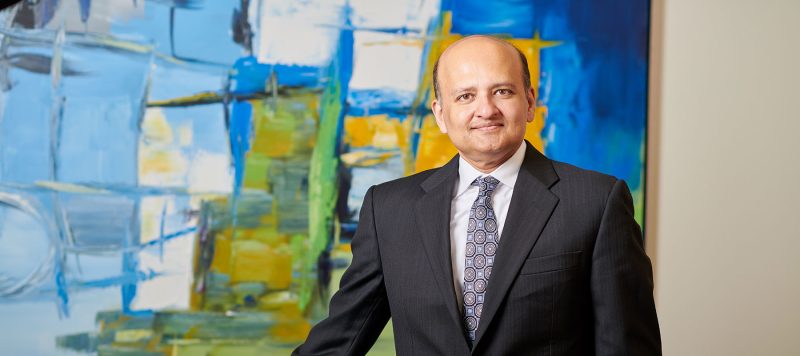ITUS Corporation is on the cutting-edge of the world’s battle against cancer. The biotechnology company is working to develop new systems to detect cancer, and therefore, treat patients effectively. ITUS is a leader in the medical field when it comes to cancer research and product development.
The man at the forefront of ITUS’s work is Dr. Amit Kumar. The Caltech graduate and Harvard post-doc has worked in the biotechnology field for over two decades. During his time in the industry, Kumar has worked diligently to advance the products that can benefit cancer patients.
The company’s work may revolutionize medicine, and Kumar is helping lead ITUS forward into the future.
Firstly, Dr. Kumar, you joined ITUS Corporation in 2016. As a biotechnology company, it is developing technologies to battle cancer. Tell us more about ITUS and your work.
I became Chairman of the Board of ITUS in 2016, shortly after I brought a new method for non-invasive, early cancer detection to the company. I then added the roles of President and CEO in July of 2017.
ITUS has two programs underway. The first is our early cancer detection technology that has already demonstrated excellent scientific results in human testing. It is a non-invasive method to determine if an individual is tumor-bearing. Because it only requires a simple blood sample, it is very easy for the patient to take this test. It does not require prepping and it is not painful or uncomfortable like some other tests for cancer such as mammography or colonoscopy.
While we have already performed testing in humans, we are still developing the test and we hope to launch it sometime in the near future, assuming our R&D progresses as planned. We have partnered with some of the top cancer centers in the US to help us with our development. We also hope to partner with larger corporations to help us commercialize this test. We are very good at innovation, but we want to work with partners for commercialization.
Our other project is a therapy for ovarian cancer, which may also work for multiple other cancers such as prostate, lung and pancreatic cancer. The experimental therapy utilizes a new technique called Chimeric Antigen Receptor T-cell therapy. With the goal of not getting too technical, CAR-T therapy is a new technique that has worked amazingly well for certain leukemias and lymphomas, but no other cancers like solid tumors. Our approach to CAR-T technology could be the first effective technique to battle ovarian cancer, which is one of the deadliest cancers with few options for patients. The technology has shown amazing results in animal tests, and we are hoping to get into human testing by the end of 2019.
Let’s talk about the ovarian cancer in a moment, first tell us more about the early cancer detection? How important is it to create new technology to find cancer at an early stage?
That is a very good question Drew. If you look at the history of cancer, it’s clear that we have learned a lot, and we have become better at treating it. We have better surgical and radiological procedures, better therapies, and supportive treatment. However, the greatest impact on both mortality and morbidity has come about from early detection. The statistics are clear, when cancer, is caught at an early stage (usually Stage 1 or 2) the chance for a good outcome for the patient is high. If the same patient is diagnosed with cancer at Stage 3 or 4, it’s very rare that the patient will survive. Even with the most sophisticated medical care, the best therapies available, and the best hospitals and doctors, late stage cancer patients generally do not survive long-term. There are exceptions, but the majority of late stage patients may gain a modest extension of life, and their quality of life is not very good.
Ever since Richard Nixon signed the National Cancer Act into law in 1971, our society has spent orders of magnitude more money on developing drugs than on developing early cancer detection technologies. More recently, there has been a greater focus on early detection, because of the advances in our understanding of biology, better analytical technologies and computational innovations. ITUS is using these innovations in a unique way to develop our non-invasive cancer detection technology.
It’s important to note that when considering early cancer detection, one has to be careful not to create what are known by practitioners as “false positives” or “false negatives.” All widely used cancer screening techniques like mammography for breast cancer or prostate specific antigen (PSA) for prostate cancer have certain levels of false results. That is why it’s important for any new technique, like ours, to minimize false results while identifying the cancer as early as possible.

Kumar and ITUS are continually working on new technology. The organization’s advances are helping researchers learn more about cancer every day. ITUS is using products such as artificial intelligence to detect tumors in patients, which is proving more capable of finding cancer than doctors.
Can you tell us how your technology works?
Many of the other approaches to early cancer detection focus on measuring something circulating in the blood that has been shed by the cancer, like the actual cancer cells or DNA from tumor cells. Our approach is very different. Over the last few years, we have learned that there is a complex and dynamic interaction between our immune systems and a tumor. We can monitor those interactions by analyzing certain white blood cells in a patient’s blood and evaluating patterns using artificial intelligence. Basically, we are using the immune system of each patient to tell us about the existence of a tumor. We have demonstrated that we can find 20 different tumors, and we believe this technology will work with any tumor type.
Why do you need artificial intelligence?
The AI application we use is something called a neural network (NN). NNs can identify complex relationships in quantitative data that humans cannot. NNs can also be trained to understand these relationships, and they learn and get better over time. AI is being used for many applications like autonomous driving or facial recognition. We are using it to help us make a medical decision based on a lot of data. We have found that our AI is better at finding cancer than the best trained doctors or scientists. In fact, I was the primary inventor of this technology, yet I cannot look at the data and make the calls as well as our NN software. Other scientists and highly experienced doctors including oncologists and pathologists cannot either. It is clear that AI is going to have tremendous impact in many fields including medicine.
Kumar is also looking for better ways to treat patients. Years ago, he realized it was important to become more proactive rather than reactive, and it has led to a new approach to the disease.
In the past, you have worked with companies that focus on precision medicine, helping to extend cancer patients’ lives. You have mentioned previously that biotech companies should be more aggressive in finding cancer in patients much earlier. How and why did you come to this realization?
I was previously the CEO of a company that was developing methods to evaluate the genetics of advanced cancer patients, so we could provide a better understanding of how to treat those patients. What I realized, and others have as well, was that even if we had the superior genetic tests, the best we could do was to extend the patient’s life by a short period of a few months to a year or two. What would be better would be to catch the patient’s cancer a year or two earlier, in which case it could be removed or treated before it spread. In most of those cases of early detection, we could save the patient’s life and also save money for our healthcare system.
In addition to running ITUS Corporation and driving our cancer technologies, I am a volunteer board member of the American Cancer Society, which is the largest non-profit cancer organization in the world. ACS has a number of programs including funding research, subsidizing cancer therapies, and compiling extensive data on our battle against cancer. All of this data demonstrates that the greatest impact on cancer deaths has come from two activities: reducing smoking and early detection. Despite the billions spent on developing drugs to treat advanced cancer, early detection has a greater impact. That is why I am a big proponent of developing early detection technologies like our technology.
Many times when people think of cancer therapy their minds are cast to chemotherapy. ITUS works in the cancer therapy and treatment arena. What new developments has ITUS been working on and are there any new cancer treatments patients may be able to access in the near future?
While our initial focus was on early detection, we knew there would always be people who are diagnosed with cancer at a late stage. Scientists and physicians are constantly showing us technologies that address cancer, and for many reasons, we often decline. However, last year, one of our collaborators, The Wistar Institute, made us aware of technology they had developed that addressed certain types of ovarian cancer, for which there are no good options. After extensively reviewing the technology, we decided we wanted to invest to develop this technology. This technology utilizes a new form of immunotherapy and gene therapy that is known as CAR-T. We licensed the technology from Wistar and entered into a research collaboration with the Moffitt Cancer Center in Florida for further development. We chose to work with Moffitt, because it is one of the top CAR-T cancer centers in the world, and the key scientist who lead the team at Wistar moved to Moffitt. We now have a passionate team of very enthusiastic oncologists and other physicians and scientists at Moffitt working on getting this technology ready to test in human ovarian cancer patients.
We are all very excited about this technology because CAR-T technology has demonstrated its ability to save the lives of many leukemia and lymphoma patients for whom there were no options. Unfortunately, CAR-T technology has not worked on other types of cancers including solid tumors. The Wistar team discovered a unique biological characteristic about ovary cells that they felt would enable CAR-T to work. They conducted and published extensive animal research testing their hypothesis. Based on those animal studies, we decided to continue the development at Moffitt. We are completing the studies that will be submitted to the US FDA, enabling us to test this technology in women with ovarian cancer. Also, we have found in the scientific literature that other types of cancer might also respond. So, if we can demonstrate this technology works in ovarian cancer, it may work in other tumors like prostate, lung, pancreatic and others.
This whole area of therapy is broadly classified as immunotherapy. Chemotherapy tries to kill cancer cells directly, but with a few exceptions, chemotherapy kills too many healthy cells as well. In contrast to chemotherapy, immunotherapy seeks to improve the ability of our own immune system to battle the cancer. While there are still side effects, immunotherapy of different types has demonstrated success in many areas where traditional chemotherapy does not work. I and the scientific community believes that the immunotherapy revolution will dramatically change the way we treat cancer in the future. I also want to say that that this revolution in treatment is being driven, not only by scientific advances, but also tremendous investment.

Kumar holds degrees from some of the biggest and most famous university in the world. His vast scientific knowledge gained from Stanford, Caltech and Harvard led Kumar to cancer research. However, it wasn’t always Kumar’s plan to spend his life researching cancer and developing products to treat it.
Dr. Kumar, how did you get involved with cancer research and what specifically drew you to the ITUS Corporation?
Cancer is something that has touched everyone, including my family. In the US, 1,700 people die of cancer every single day. If we can develop our technologies and extend the lives of some of these people, the rewards to society would be tremendous.
I was not formally trained in cancer research. During my Ph.D. at Stanford and Caltech, my research focus was on electronic materials and solar cells. During my postdoctoral fellowship at Harvard, I spent my time performing more materials and microfabrication research. It was only when I left my academic training that I became a biotechnologist and have been working in that field for over 25 years. I began as a scientist and eventually also served as an executive, director and investor in a number of firms.
I came to ITUS, because I had a scientific idea and ITUS was a vehicle that enabled me to test and develop that idea. As Chairman and CEO of ITUS, my job is to do my best to create long-term shareholder value, and the best way to do that is to develop these life-saving technologies.
You have a glowing resume with major biotech companies listed on it, and you attended three of the top universities in the world: Stanford, Harvard and Caltech. What has been your biggest career highlight so far?
I have been fortunate in my career and lots of great things have happened, but I like to think that my biggest career highlight is yet to come. I was lucky enough to study, as you noted, at some of the best universities in the world. Those institutions enabled me to study and conduct research with the most accomplished scientists of our day, in many different and interdisciplinary fields of science.
After my formal education, I was again fortunate enough to work on some very exciting projects. It has been rewarding to know that many of the products developed by me, and companies that I helped build and run, have helped thousands of people. It was my mother’s wish that I choose to be a physician like her, but I decided I liked research better. As it turns out, I feel that I have had a bigger impact by developing products that have helped more people than I could have as a physician. It’s very rewarding to run into people who tell me they used something, with which I was involved, to help them in a particular situation.
Dr Kumar, how will cancer detection and treatment change over the next 10 years?
The next 10 years will see revolutionary changes. Even though we have only scratched the surface of our understanding of the physiology of cancer and immunology, indications tell us that we have identified many approaches that will work better than our traditional chemotherapies. I truly believe we will look back in a decade or two and be aghast at how we deal with cancer today.
Is there a chance, with the continued developments made by yourself and ITUS and other companies, cancer could be eliminated one day?
I hesitate to say that cancer can be eliminated, because cancer is really thousands of different diseases. All cancers, by definition, are characterized by rapid and unencumbered cell growth. The pathways which induce that immortality in those cells are many for different cancer types and even within the same organ system. Each pathway is a different disease, and over time all cancers will be characterized by their genetic signature, rather than organ system. Regardless of the type of cancer or the genetic mutations that characterize it, catching it early is the greatest determinant of survival for the patient. Cancer has always been with us and will continue to be. We are getting better at battling it and detecting it early, so in the future it may not be such a scary disease, but I don’t think we can eliminate it and curing all cancers is not something I can envision in the near future.
Kumar’s life isn’t just about research and building a better tomorrow for cancer patients. A devoted husband and father, Kumar has worked hard to instill strong values into his children. He is now seeing his daughters leave home for university, and they too may begin making their marks on society just as their father has.

Tell us about your family and personal life?
Throughout my life, in good and tough times, I have been fortunate to have a wonderful and supportive family. My physician mother was a single mom as my father had passed away when I was seven. She was one of very few female OBGYNs in the 1970s, and she had to practice medicine and raise three children — myself, a younger sister and brother — by herself. Fortunately, we had lots of help from our grandparents. My grandfather was instrumental in instilling in me a curiosity and love of science. When I was older, I married my wife of 25 years, Ruma, who is also a physician. We have two precious daughters, Anika and Anissa.
When they were young, we again were fortunate to have help from their grandparents, my in-laws. Without their help my wife and I would not have been able to advance our careers. Anika has left home and is a freshman at UC Berkeley, and Anissa is finishing her junior year in high school and will also be leaving home in a year. My wife and I are still trying to figure out how to handle our soon to be empty nest. We know that we have instilled strong values in our daughters and it will be wonderful to see how they navigate their lives.
Kumar and ITUS may not eliminate cancer completely in the world, but they can make it easier to detect and treat. The future looks bright for Kumar and his company; and it could be even brighter for those suffering with cancer as well.
ITUS Corporation
3150 Almaden Expressway
Suite 250
San Jose, CA 95118
https://www.ituscorp.com
Images credit Brian Byllesby

Journalist and author. Contributor











